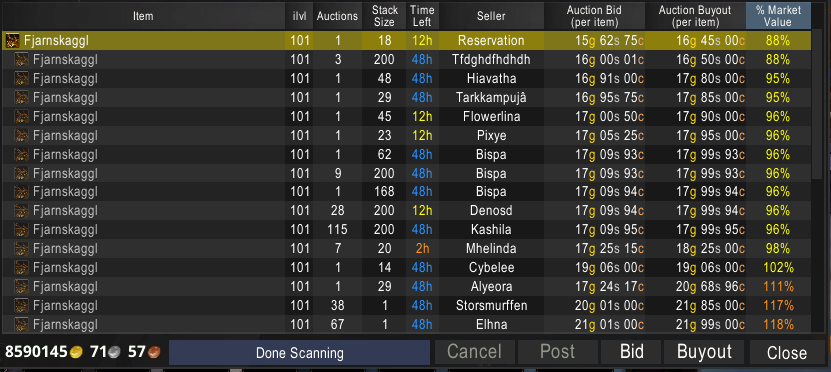Selling items in the right stack size can increase your profits by a lot. It is not uncommon to be able to increase your prices by 20% or more. This obviously only holds true for items that can actually be sold in stacks.
Now we want to figure out what the right stack size is. I am going to tell you how you can figure out what the most profitable stack size will be, but at the end of the day you will have to experience. Different stack sizes sell at different speeds and price levels, and finding the right one for your markets takes some experimentation. I’ll also highlight some examples of stack sizes for some common gold making items.
Who is your customer?
This is the question you need to ask yourself. Why are people buying your item? What are they going to use it for? Answering these two questions will help you figure out which stack sizes are most attractive.
If you can sell items in the exact stack size they are looking for they will often be willing to pay more, just to save a few clicks on the auction house UI. In general there are two main ways to size your stacks. Specifically tailored to specific crafting recipes/uses or as big as possible when selling to mass-crafters. In general you will want to go as big as possible for most Legion materials, as your best customers there are bulk-buyers. For old expansion materials you can usually have great success sizing your stacks for specific recipes.
Example: Living Steel
Let’s take a look at living steel for example. If you want to figure out the best stack size for this you would first want to figure out why people buy it. Trade skill materials are only useful as recipes. The first step is to check the recipe list on wowhead for your item.Which recipes is it used for and in what quantities is what you want to figure out. Then you want to figure out which of these recipes people are crafting the most of.
Living steel is used in a whooping 57 recipes. Most of these are various epic armor pieces from Pandaria. As these are only used for transmog, the demand is low, but for the right buyer they can be interesting. Sadly people will not be mass crafting these so they are not particularly interesting. The main recipes people craft a lot of still are the mounts, primarily the sky golem and the JC panthers. They require 30 and 4 living steel per craft. So both of these stack sizes can be nice to pursue. To find a good number of stacks to post at the same time you can check out the item on wowuction.com. It shows an estimate of the number of sales per day. Your operations should not post much more than the average number of daily sales on your realm as you will most likely just spend a lot on deposits.
Example: max stack sizes
The most obvious example for maximum stack sizes are pretty much all Legion crafting materials. Big time crafters will be buying literally hundreds of items at the time. you can get a decent premium by posting slightly more expensive stacks of 200. I will often even buyt out everything below the cheapest 200 stack and the 200 stacks as well. This is true for leather, cloth, ore, arkhana, leylight shards, herbs etc.
As an example look at the Fjarnskaggl posted on my realm. The 3 stacks of 200 posted at 16.5 gold are underpriced. He should have posted them at least at 17.98, undercutting the cheapest 200 stacks. Theres a very large chance that large AH players will buyout almost everything priced below 18 gold in this screenshot.

Optimal TSM setup
When we use the good stack sizes we want to make sure that we post our auctions above the cheapest auctions generally. TSM has a very useful setting for our auctioning operations. On the general tab of an auctioning operations settings we want to check the “Match Stack Size” check box you see in the screen shot below. This will make TSM ignore the prices of any auctions using a different stack size. If you are posting in stacks of 200 it will only consider other stacks of 200. This is a staple of my obliterum operation that posts in stacks of 10, as that is the maximum number that can be used on one item.

Next we want to make sure that we actually get a higher than average price for our items. Usually you will do this by setting the minimum price higher than usual. For my bar posting operations I use 110% dbhistorical as the minimum price, other examples can be 110%dbmarket, 100% dbmarket, or other variations. This obviously depends on what your aqcuisition price is.
In summary
This is not an exact science. You will have to reassess how fast your items are selling and how happy you are with your prices. It is a necessity to re-evaluate as you go. If you do a lot of business in tradeskill materials it can give you a very good bit of profit though, so I strongly suggest that you test it out.
